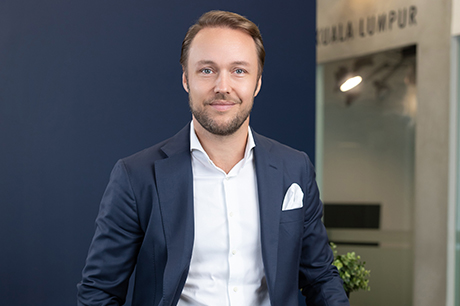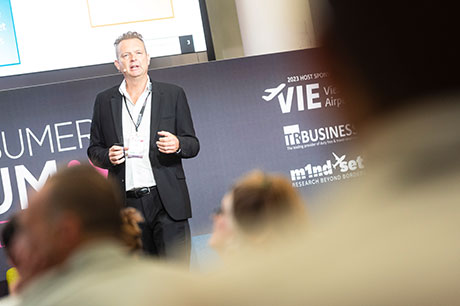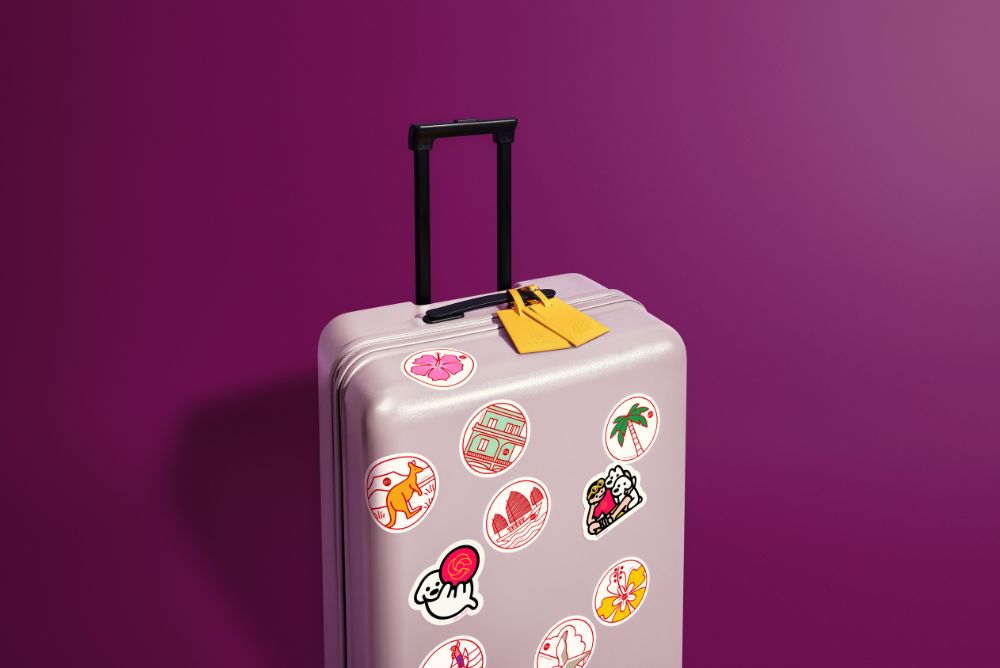Nordic Travel Retail Seminar: The talking points
By Luke Barras-hill |

The Scandic Holmenkollen Park hotel is situated in the idyllic surroundings of Kongeveien, nestled in the suburbs of Oslo.
Unboxing Norway’s tourism challenge, extracting best value in pressured workplace environments and the cultural implications for business were headline topics during the Nordic Travel Retail Seminar.
Organised by the Nordic Travel Retail Group (NTRG), the annual gathering drew around 100 guests to the Scandic Holmenkollen Park hotel in Oslo, Norway (23 May).
The Scandinavian and Baltic DF&TR market, comprising airports, cruise/ferry, border shops and airlines, remains a vital artery of European travel retail and delegates were once again treated to a series of presentations that drew on the region’s eclectic mix of charm and humour while addressing pressing issues.

Eva Rehnström, Chairperson, Nordic Travel Retail Group and Purchasing Manager, Viking Line, welcomed delegates to the Nordic Travel Retail Seminar.
IMPROVING ‘BRAND NORWAY’
The one-day conference agenda was supplemented by ample networking time, including a trip to the nearby ski jump and a dinner hosted at the hotel.
Eva Rehnström, Chairperson, NTRG opened the first session of the seminar, which centred on the theme of culture.
Moderator Dermott Davitt, President and Co-owner at the Moodie Davitt Report, then provided some initial comments.
He reminded attendees that the association’s Board favours a big macro-economic take of the Nordic and Baltic travel retail industry, which is heavily impacted – negatively and positively – by aviation, tourism and associated external factors such as currency fluctuations and macro-economic and geopolitical crises.
National identity, culture and business management styles also have the propensity to shape wider insights and value delivery for the entire channel.
Bente Bratland Holme, Director of tourism organisation VisitNorway, delivered the first address in which she identified some of the challenges facing the Norwegian travel industry and building Norway as a year-round tourism destination.
While she predicted another record summer for Norway’s tourism trade this year with strong summer bookings, she admitted: “The challenge for me and my Swedish, Danish and Finnish colleagues is filling the gap in the rest of the year.”
In a frank assessment of the country’s past, present and future, she said the country faces challenges. Pre-conceptions of its boundless beauty – via the mountains, Fjords and inextricable ties to nature – and oil-rich lands are the main messages conveyed in surveys conducted by VisitNorway among potential travellers.
As such, Bratland Holme said there remains a lack of urgency to compel people to travel to the country, with greater focus needed on proving value for money, good local cuisine, immersive cultural attractions and art, and more conviviality.
“We fail on food, we fail on culture and fail on value for money,” she declared. “We can’t do much on money, but we can work on the others. We need to talk to people in a new way; you can’t advertise this, we need to do marketing in a different way than we have [done] in the past.”
She went on to say. “People don’t want to be sold to, they want to have it their way and be moved. If you go out with a message, you need to make sure it hits them. If we want to succeed in the future as a good brand, we have to talk. This isn’t about advertising, it’s about storytelling.”
To illustrate the point, she pointed out that there are more than 1.24bn websites in the world and people are living ‘in the age of scrolling’, covering up to 90 ‘scrolling’ metres on websites per day.
In order to tackle this opportunity, VisitNorway.com has overhauled its website, overlaying it with stories, music and cultural themes.
She said 80% of screen time concerns moving pictures and as such, the organisation has shifted towards storytelling through film.
She said moving from a market-focused approach (asking Germans what they want from Norway) to storytelling whereby Norwegian people are asked what the country should be broadcasting to the world has signalled a big change.
Concluding, she said the organisation seeks to hit a number of important metrics to edge forward its tourism message in the coming five years, with a particular emphasis on sustainability.
In a Q&A with Davitt she said brand ‘Scandinavia’ is strong, but distinguishing that message between the different countries is difficult.
In last 10 years, the country has welcomed one million new guests to the country and half of that has come from overseas, particularly the US and China.
“We have a very specific Chinese strategy that we don’t do marketing in the summer. We are only going for individuals (not group tours but free independent travellers) and doing winter season marketing.
“The fact is in Norway, it is fully booked in places during a few weeks in the summer. We have 50% occupancy during the whole year, so we need to work on new groups to come.”

Professor Morten T. Hansen delivered a stirring speech on maximising organisational efficiencies to deliver best value.
WORK ETHICS: VALUE NOT VOLUME
Delivering the opening keynote was Morten T. Hansen, Professor at the University of California, Berkley, who delved conceptually into the mechanics of work management; working smarter, not harder, in organisations to increase value.
He began by recounting the tale of the great expedition in the Antarctic in 1911 involving British explorer Robert Falcon Scott and Norwegian Roald Amundsen, who competed with their teams to reach the South Pole.
He regaled visitors with the trials and tribulations of the gruelling race and unpicked the decisions that ultimately won and lost Amundsen and Scott, respectively, the challenge.
He said: “The journey to the South Pole illustrates a fundamental challenge that we all have in business today.
“Number one, an environment full of uncertainty. Given the digital evolution and all the changes happening in the retail space, there is a tremendous amount of uncertainty that perhaps we’ve never seen in the business before.
“Number two, if you mess up it has big consequences. In retail, you may just go bankrupt. In this kind of environment, it’s not that you may lose sales of 2-3%, it is that you might go under. The consequences are far greater than they have been in the past.
“Third, it is an environment that requires innovation. If you stand still and don’t innovate – not only in product but how you run the business – then you will ‘die’.
“The question then become how do you perform and become great?” He said, outlining that this has been at the forefront of a series of published books over the years, including ‘Great at Work’.
This studied 5,000 teams, businesses and leaders in corporate America speaking about good performance across a variety of sectors.
BIG BUSINESS CONSEQUENCES
During his presentation, Hansen identified influencing factors such as talent, hours, grit, education and experience on performance and said there are seven factors that determine success in a business environment.
He then outlined a series of ‘work-smart’ scenarios and challenged the audience to select where they fitted in professionally.
Frequently, complexity in work planning poses a sizeable obstacle to professional efficiency, with people tending to occupy the following descriptors: Accept more, then coast; do more, then stress; do less, no stress; do less, then obsess.
By taking on too much, you become a master of none and mediocre at all, he said – a problem in a complex travel retail world.
The solution is to re-think the way we undertake work and to innovate while we’re doing it, he continued.
Robert Falcon Scott fitted into the ‘do more, then stress’ approach, whereas Roald Amundsen was ‘do less, then obsess’, said Hansen, adding that all of us must obsess to excel in work and life.
Do less, then obsess is the approach that in general, garners the best results, he said.
“You have to be able to say no – it is easy to say no to a bad idea, but more difficult to say no to a really good idea that you can’t work on,” he told delegates.
Part of the solution to creating new value is collating a ‘stop-doing’ list to reduce the number of activities undertaken. These could include meetings, task forces, emails, sign-offs and decision-making chains.
He continued that a great deal of businesses are focusing on the wrong objectives by focusing too much on internal rather than value metrics i.e. fulfilment percentages rather than customer satisfaction levels.
“We need to look at value rather than productivity; there are so many businesses getting this wrong,” said Hansen. “If you start thinking about value rather than volume, you start thinking differently about the business.”
Relating things back to retail, Hansen questioned whether what is being measured in a tax free shop to correlate means to results is being achieved.
“We cannot equate buying and sales with value, we must move beyond that. Most businesses do not.”
He advised setting clear objectives, limiting the number of those objectives, saying ‘no’ to distractions and obsessing about the results.
Siphoning best value from an organisation’s staff can be split into two areas to determine worth: Passion and purpose.
Hansen said these should be treated as completely different concepts as lots of people have both and lots of people have neither.
Striking the right balance is important in retail, he continued, but the ability to communicate verbally – agreeing and disagreeing – is fundamental to success.
He drew on the example of UK-based consumer goods company Reckitt Benckiser, which emerged as the 16th most important company in a published journal in the Harvard Business School based on CEOs that deliver the greatest value to shareholders.
Former CEO Bart Becht reduced a big product portfolio to 12 power brands, with impressive results, Hansen told delegates.
“They employ a fight and unite culture in meetings – lots of businesses aren’t doing that.
“Not all time in life is equal in business, there are tremendous inflection points, particularly in retail. There is a tsunami of a storm hitting the sector. You can see it as a fear or an opportunity. Change offers opportunity.”

Sarah Branquinho said the democratisation of air travel brings new opportunities and responsibilities for the business.
CHANGE BRINGS RESPONSIBILITY
In the second session of the day, former European Travel Retail Confederation President Sarah Branquinho was next to take to the stage.
As a long-serving and passionate advocate of the Industry, Branquinho – now semi-retired but acting as an External Affairs Advisor to Dufry – shared some of her personal wisdom on culture, the shifting flows and trajectories of the industry, and its wider socio-economic impacts.
She began by stressing the business is not immune to the extraordinary social change occurring around the globe.
“We’re one of the few industries that can truly claim to be at the crossroads of cultures and demographics; but we’re also experiencing extraordinary social change and we won’t be immune to it.”
Branquinho then guided delegates on a visual journey, from the glamour of flying in 1950s and the rise of the package holiday in the 1980s to the age of wealth proliferation and acceleration in long-haul flights in the 1990s and the boom in LCCs today.
Underpinning the substantial democratisation in air travel that has occurred over the generations, she drew on an example from the UN World Tourism Organization that put tourist arrivals in 1950 at 25m – a small number compared to the 1.2bn today.
“Every day our industry serves millions of people on the move, whether it’s for work, pleasure, or a myriad of other reasons. We’re culturally and ethically diverse, with very different beliefs and motivations including whether we shop or don’t as part of the journey.
“But we also span different generations with different aspirations. Never in history have so many generations been active at the same time.”
Using an example of a Louis Vuitton boutique at Istanbul Airport, Branquinho said that despite the huge generational shifts in travel over the years, the same people are shopping.
Baby boomers, millennials, Generation X and Generation Z are frequently touted as the targeted audiences for today’s travel retail shops, which operate across areas such as gifting, value and aspiration.
Notwithstanding this, Branquinho urged the industry not to forget older generational travellers with the time and money to add significant value.
“We are probably the people who spend the most time in our stores, we get to the airport early, we spend hours in the shops and no one talks about us.
“I would urge those of you out there to think a little bit more about this generation, which has more money and is less inclined to spend on the internet and are more likely to be tempted into long stays at the airport or on cruise ships. One billion out of seven billion (travellers) is surely worth targeting.”
She also flagged that less fortunate customers with vastly different incomes and needs – yet those who contribute to the low-cost boom – should not be forgotten.
“Their needs, aspirations and luxuries are a lot different: Let’s not forget when we’re talking about culture and who we serve, we’re actually talking about not just different countries with different demographics and disposable incomes, but these people.”
Concluding, she challenged the industry to think more carefully about the mounting environmental pressures in today’s society, referencing the United Nations’ 17 Sustainable Development Goals as offering a fundamental step-change to enacting real change.

Former professional footballer Jan Åge Fjørtoft shared key messages around leadership, communication and teamwork.
‘WINNING THE CROWD’
Hjarrand Hillgaar, Chief Analyst, Color Line AS then took to stage.
In an abstract presentation, he urged delegates not to underestimate low probabilities nor overestimate high probabilities in the workplace; above, all be prepared for changes.
This means striking a good balance between inside and outside views and ensuring you undertake thorough post-mortems of successes and failures.
He said arguments and counterarguments should be evaluated and instructed delegates to look into the future.
Relating his thoughts to retail, he said: “We don’t argue – we test (in shops). As long as we only apply one activity or price change at a time, we can evaluate whether it is successful.”
He used an example in 2013, when customers wanted to obtain more information on price per pack for snus, a popular Scandinavian tobacco product.
After introducing single pack snus, receipts on Norway to Sweden Color Line routes have experienced ‘massive’ successes.
In a Q&A, he was asked about the changing expectations of customers onboard Color Line.
Hilgaar commented that it remains tough to cater to older and younger customers.
Concluding, he stated that a focus on relevance is more important than making +2% more sales.
In a lively, colourful and inspirational end keynote, former Norwegian professional footballer Jan Åge Fjørtoft recounted his memories playing for a spate of teams in the UK and Europe, including Rapid Vienna, Eintracht Frankfurt, Middlesborough, Swindon Town and Barnsley.
He was also a player in the Norwegian national team that knocked England out of FIFA World Cup qualifying in 1994.
Fjørtoft compelled the audience to ‘win the crowd’, whatever vocation they find themselves in.
Drawing together key threads around leadership and communication, he revealed that the best quality of any team is having selfish people and a group of individuals.
“In a team we need people who dare to go forward,” he added.
Alcohol insights: Conversion up, spend down in Q4
Conversion of visitors in the alcohol category in duty free has risen to 54% in Q4 2023,...
Heinemann Asia Pacific makes breakthrough in New Zealand at AKL
Heinemann Asia Pacific is set to enter the New Zealand market with three new retail concepts at...
Men buy and spend more in travel retail says new research by m1nd-set
Men have a higher conversion rate and spend more when shopping in travel retail, says new...

In the Magazine
TRBusiness Magazine is free to access. Read the latest issue now.

 Trbusiness. The travel retail Trbusiness. The magazine for global retail and duty free professionals.
Trbusiness. The travel retail Trbusiness. The magazine for global retail and duty free professionals.
























